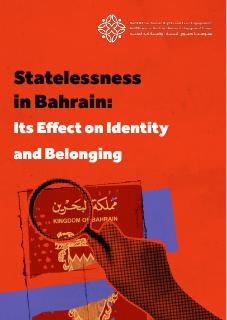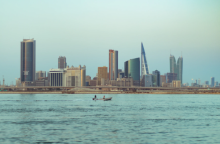“The vast majority became instantly stateless with no alternative citizenship [due to citizenship stripping]. The consequences of such a decision affected us in all avenues of our life.”
Jawad Fairooz, a former Bahraini Member of Parliament and chair of SALAM DHR
KEY ISSUES
- The nationality law of Bahrain discriminates against women in relation to the conferral of nationality to their children, which can lead to a risk of statelessness.
- There are no safeguards in law for children born in the country who would otherwise be stateless to acquire Bahraini citizenship.
- Minority ethnic groups in Bahrain, such as the Bidoon and Ajam populations, have been subject to historic discrimination that has rendered them stateless. The impact of gender discriminatory nationality laws and intergenerational statelessness is especially pronounced for these groups.
- Nationality deprivation has been used as a tool by the Bahraini government to target political opponents and human rights defenders, with hundreds of people having their nationality revoked since 2012.
- Bahrain is not a state party to either the 1954 or 1961 Statelessness Conventions and has no statelessness determination or protection framework in place.
STATELESSNESS IN BAHRAIN
Statelessness in Bahrain is most often caused and perpetuated by discrimination on various grounds such as gender, race, ethnicity, disability and socio-economic status. Since 2012, hundreds of Bahrainis have also had their nationality revoked via executive order, royal decrees or court decisions. The majority of those affected were rendered stateless as a result. The government’s practice of citizenship deprivation has been widely criticised as a harmful, arbitrary and anti-democratic tool, used to crack down on dissent and maintain its grip on power. While 985 individuals are known to have been deprived on Bahraini nationality in this way, there are no officially recorded statistics on the number of stateless people in Bahrain.
The Bidoon are individuals who have historically lived in the country but have been denied the right to a nationality, often because they missed out on the initial registration of citizens at the point of state formation. In the past, Bahrain took some positive steps in granting nationality to many from this community, specifically in 2008 when 7,012 individuals – including many Bidoon – were naturalised. While there are no exact numbers, there are still several thousand stateless Bidoon in Bahrain, with estimates ranging from 2,000 – 5,000 Bidoon families who have not been granted nationality despite being eligible under Bahraini law. The Ajam population, an ethno-religious group of predominantly Shia individuals of Persian descent, have also faced discrimination in access to citizenship that has resulted in many being stateless, including children. After the Iranian revolution in the 1980s, hundreds of Ajam families were removed from Bahrain and were unable to renew their passports, effectively rendering them stateless. When the King came into power in 1999, he allowed the families to return and reinstated their nationality, but problems persist for this community. Combined with longstanding forms of institutionalised discrimination against the country’s majority Shia population, the specific denial of citizenship for Ajam has forced the community disproportionately into lower socioeconomic conditions. Being both Shia and stateless, they are even more likely to be denied access to social welfare or assistance programmes available to Bahraini citizens. The existence of statelessness among both the Bidoon and Ajam communities is exacerbated by gender discrimination in Bahrain’s nationality law. Stateless people in Bahrain are denied civil, political, and economic rights; they have no access to healthcare, education, official documentation, bank accounts, unemployment benefits, travel, housing and social benefit programmes. Those whose nationality has been revoked will not be able to access their pensions until and unless they regain their Bahraini nationality.
Bahrain is not a state party to either of the statelessness conventions and has no system for identifying and responding to statelessness. People who are stateless or have had their Bahraini nationality revoked lose access to bank accounts, the right to work, access to education, pensions, healthcare, any housing allowances, and the right to register their child at birth. As citizenship is only passed to children through male citizens, children born to a father who is stateless or has been stripped of his citizenship, will not be considered Bahraini citizens, even when the mother is a Bahraini citizen. Stateless children in Bahrain also face significant challenges in accessing basic rights – they have to renew their residency permits yearly and once they are adults, they have to be sponsored by an employer to continue living in Bahrain. If the father had their citizenship removed after the child had already acquired his nationality, mothers are unable to complete processes such as passport renewal for their children, because the father is still alive. A possible solution is for the mother to apply to the Court for guardianship of the child, but this requires the father to give up parental rights.
THE RIGHT TO NATIONALITY IN BAHRAIN
Law No (10) of 1981 Amending the 1961 Bahraini Citizenship Act sets out who is a Bahraini national, with Article 4 prescribing the main mechanism of transferral of nationality as paternal jus sanguinis – i.e. by descent from a Bahraini father. Under Article 4, children born to Bahraini mothers may only acquire nationality in cases where their father is “unknown, without nationality or fatherhood was not substantiated”. There are major challenges in the implementation of this provision in practice.
According to Article 5 of the Bahraini Citizenship Act, individuals are nationals by birth via jus soli if they were born in Bahrain and their father “was also born in Bahrain and has made Bahrain his permanent residence, at the time of birth of that person, provided, however, that this person is not holding another nationality”. Acquisition of nationality jus soli and jus sanguinis are thus both discriminatory on the basis of gender. There are no safeguards in law for children born in the country who would otherwise be stateless to acquire Bahraini citizenship, however, the law does provide for an automatic entitlement to Bahraini citizenship by birth for foundlings.
The requirements for naturalisation can be found in Article 6(1) and demand an unusually long residence period that differs between Arabs and non-Arabs: 15 years’ legal residence for the former, 25 years for the latter. This is in addition to requirements regarding ‘good conduct’, fluency in Arabic, and registered real estate in the country. There is no facilitated naturalisation for stateless people. However, Article 6(2) grants a discretionary naturalisation power to the King that supersedes the 6(1) requirements. This power has been exercised many times, often to those who do not fulfil any of the 6(1) requirements. Recipients include foreign celebrities, athletes, and academics. In addition, there have been cases of ‘mass naturalisation’ reported, which have purportedly been intended to alter the demographic balance of the country in favour of the Sunni minority, which the ruling family is a part of, at the expense of the Shia Muslim majority. The 70,000 Bahrainis naturalised between 2001 and 2007 were able to bypass the restriction normally placed on naturalised Bahrainis in terms of the right to vote, allowing them to immediately participate in the 2002 and 2006 elections upon receiving their Bahraini citizenship. In 2011, it is known that at least 2,500 citizens were granted citizenship and a place in the Bahrain army with the aim of responding to the Arab Spring uprising.
Article 7 of the Constitution of Bahrain allows for citizens to be stripped of their nationality “in case of treason, and such other cases as prescribed by law”. Hundreds of Bahrainis were deprived of their nationality in 2012 via a ministerial order from the executive. However, this order was challenged for lacking a legal basis. In 2014, amendments to the Citizenship Law of 1963 and the Protecting Society from Terrorism Act granted revocation powers to the Prime Minister and the judiciary. The Interior Ministry, with the approval of the Cabinet, is able to strip nationality of a citizen who “aids or is involved in the service of a hostile state”, or who “causes harm to the interests of the Kingdom or acts in a way that contravenes his duty of loyalty to it”. By 2019, the high number of nationality revocations by the courts had received international attention and the Protecting Society from Terrorism Act was amended again to remove this power from judges, leaving only the King and Prime Minister (on request from the Interior Ministry) able to revoke nationality. Bahraini policy is often dictated by royal decrees, and courts in Bahrain have previously ruled that they have no jurisdiction over decisions on nationality. As a result, the executive – the king and even cabinet ministers – have wide discretion to both naturalize and denaturalize individuals.
NATIONALITY DEPRIVATION AS A POLITICAL TOOL
Bahrain has witnessed a deteriorating human rights situation since the 2011 uprising – an anti-government movement largely led by the Shia majority, that was brutally supressed after advocating for reform by the Sunni minority ruling party. Security forces enjoy a culture of impunity, while the government continues to abuse laws, ostensibly to protect society from terrorist acts; a pretext that is used to justify and legitimise authoritarian and regressive practices against citizens. One such practice is citizenship deprivation.
While Bahrain has regulated deprivation of nationality in national law as a punitive measure since 1963, and it has been a tool of political repression for decades, the 2011 non-violent mass protests led to a dramatic increase in citizenship stripping practices. Since 2012, the government has engaged in revocation of nationality as a tool of oppression, unlawfully targeting political opposition leaders, human rights activists, journalists, academics, religious scholars and even people who do not have any religious or political affiliation. These arbitrary nationality deprivations were carried out through various means – royal decrees, judicial rulings and ministerial orders – often without any legal basis and with subsequent legislative amendments being introduced to create an illusion of lawfulness. In many cases, citizenship was revoked while the person was abroad, leaving them stateless and stranded. People who were targeted while in Bahrain became irregular non-citizens and were often arrested and detained, where they were subjected to torture and ill-treatment, and ultimately expulsion from the country. Individuals in Bahrain need a sponsor to regularise their residency, but those without a nationality lack capacity to be sponsored due to a lack of documentation and are subject to deportation. Those being deported would be provided with a passport that labelled them as a “resident of Bahrain” rather than a national and sent to countries that do not require visas for Bahrainis such as Iraq and Lebanon. Officers at these receiving airports often did not check that the passport did not provide proof of nationality and automatically granted 6 months residency. After 6 months, these individuals must attempt to travel elsewhere or else stay as an illegal resident.
A total of 985 Bahraini citizens reportedly had their nationality revoked between 2012 and 2019, making Bahrain the “global leader” in the problematic practice of citizenship deprivation over the past decade. Of those targeted, 970 were politicians (particularly from Bahrain’s opposition, originally from the Shi’a demographic group) and activists. Subsequent crackdowns by Bahrain’s authorities heralded a new phase of the practice of political deprivation of nationality, where mass revocations became a quasi-legislative instrument of performing social and political purges. For instance, on 15 May 2018, a Bahraini criminal court stripped nationality from 115 individuals after they were deemed to be members of a terrorist group in a mass trial and sentenced to prison in Bahrain. The fact that the vast majority of those who have had their citizenships stripped are from the Shi’a community, suggests sectarian motivations behind this practice in Bahrain.
There has been some improvement following international condemnation of Bahrain’s citizenship revocation during the third cycle of the Universal Periodic Review in 2017. In April 2019, King Hamad bin Isa Al Khalifa restored Bahraini citizenship to 551 individuals and the power to strip nationality was restricted to the Cabinet. These reforms have not in practice rectified the issues of citizenship deprivation and statelessness. Individuals who have had their Bahraini citizenship restored do not enjoy full rights in respect to housing, social allowances, social welfare, and healthcare, and continue to face discrimination and harassment from Bahraini institutions, as well as restrictions to their political rights. These individuals have received no reparations for any finances or properties seized upon revocation of their citizenship or for the subsequent additional hardships experienced. The mechanisms that enable the arbitrary removal of nationality still remain in place and those responsible for their use as a means of political repression are not subject to any form of accountability. 434 people whose nationality was stripped remain without Bahraini citizenship, many of them stateless.
GENDER DISCRIMINATION AND THE CHILD’S RIGHT TO NATIONALITY
While the Constitution of Bahrain enshrines equality for women and men, Bahrain remains one of 24 countries globally where women cannot confer their nationality on children in the same manner as men. Under the Citizenship Act of 1963, as amended, Bahraini men have the automatic right to confer nationality on their children and may confer nationality on their noncitizen spouse, but Bahraini women are denied this right, resulting in wide-ranging human rights violations, undermining women’s equal citizenship and contributing to the root causes of gender-based violence. For example, as naturalised Bahraini women may lose their nationality upon divorce, they face the risk of being deported from the country and separated from their children, if they end an abusive marriage. Women who are divorced may apply to the Supreme Council of Women for their nationality, but the Council is headed by the King’s wife and decisions have to be approved by the King. Stateless girls are at increased risk of child marriage, with some families viewing marriage as the only way to secure citizenship and residency rights for undocumented girls.
When a child cannot obtain the nationality of the father, they are at heightened risk of becoming stateless, and this is exacerbated in Bahrain given that there are already a substantial number of stateless people in the country. In order to transfer nationality to their children, unless the father is stateless, women have to actively demonstrate that the father is unknown or that fatherhood was not substantiated. However, it is unclear whether this provision is ever implemented, and the social repercussions of registering a child with an unknown father may be too severe in many cases for mothers to pursue this option. Furthermore, even in the case of stateless fathers, it is evident that many Bahraini women married to Bidoon men have not been able to transfer their nationality to their children, despite the law being clear on this point.
Bahrain has taken some positive steps on this matter. In 2009, the government established a waiver, granting access to certain state services for children of foreign fathers. Law (35) of 2009 mandates that children of Bahraini women married to non-nationals are exempt from residency, health care, and educations fees, on an equal basis with citizens. Nevertheless, inequality persists with the children of Bahraini citizens denied equal access to university scholarships, employment, and housing that is granted to the children of Bahraini men. The children and spouses of Bahraini women must apply for residency permits to reside in the country with their mother/spouse. Upon reaching the age of majority, the non-citizen children of Bahraini women must obtain a work sponsor to remain in the country, otherwise they may be deported – even if they were born and raised in Bahrain. The non-citizen children of Bahraini women are often unable to access their inheritance, including the family home, due to restrictions on property ownership by foreigners. Bahraini women married to foreigners whose families are suffering financial hardships are also denied financial support, which is provided to low-income Bahrainis, simply because they are married to a foreigner.
In 2013 the General Secretary of Bahrain’s Supreme Council of Women announced that many children of Bahraini women married to non-Bahraini nationals be granted Bahraini nationality by Royal Decree. However, Royal Decrees provide only ad hoc remedies without addressing the foundational problem of discrimination which undermines every child’s right to acquire a nationality. A legislative solution that applies to every child as a permanent safeguard against statelessness is a more appropriate and sustainable solution. In January 2014, the cabinet approved a proposed law to pass the citizenship of Bahraini mothers to their children under certain conditions and this was forwarded to the council of representatives for discussion and approval. However, there has been no conclusion of this review and no amendment. In April 2017, the council of representatives reportedly rejected the proposal altogether, partially on the grounds that the 2009 waiver for services was sufficient.
BAHRAIN’S INTERNATIONAL COMMITMENTS
Bahrain is not a signatory to either the 1954 or 1961 Statelessness Conventions. Bahrain has acceded to the, ICCPR, ICERD, and CRPD for which it maintains no reservations against the provisions relating to nationality. While Bahrain has acceded to the CEDAW it maintains a reservation against Article 9, paragraph 2 of CEDAW. For more information on regional standards and intergovernmental commitments in MENA, see the StatelessHub MENA page.
The content on this page was reviewed by SALAM for Democracy and Human Rights
[Last updated December 2023]
Cover image by Charles-Adrien Fournier
VOICES & EXPERIENCES
-
Arbitrary revocation of nationality in Bahrain: A tool of oppression
![Bahrain]()
Arbitrary revocation of nationality in Bahrain: A tool of oppression
![Bahrain]()
“Various UN human rights mechanisms have repeatedly called on Bahrain to take specific steps to amend its counter-terrorism legislation, and to ensure that citizenship is not revoked except in accordance with international standards and under independent judicial review.”
Michelle Bachelet
Former UN High Commissioner for Human Rights
The case of Bahrain represents a powerful example of how legislation introduced under the pretext of national security and counterterrorism, can be weaponised against political opponents, dissidents and human rights defenders, leading to arbitrary deprivation of their citizenship. In 2011, during the height of the Arab Spring in the Middle East, protests erupted in the Kingdom of Bahrain. Deeming these demonstrations to be a national security threat, the Government reacted with a set of regressive reforms. It progressively expanded the grounds for nationality deprivation and consolidated the power to deprive Bahrainis of nationality at the behest of the Minister of Interior.
Voice from https://files.institutesi.org/Arbitrary_Revocation_of_Nationality_in_Bahrain.pdf
-
Gender discrimination in Bahrain’s nationality laws
![Bahrain]()
Gender discrimination in Bahrain’s nationality laws
![Bahrain]()
“My children are treated like foreigners despite living and being born in Bahrain.”
Rahima
Bahraini woman
Rahima Naser is a Bahraini woman married to a non-national and mother of three children (two daughters and one son). Her children were ineligible for university scholarships, despite graduating from high school with honours, simply because they are not considered Bahraini.
Women in Bahrain cannot pass their nationality to their child on an equal basis as men. This discrimination perpetuates the risk of statelessness and contributes to violence against women and children. While Bahraini men have the automatic right to confer nationality on their children and may confer nationality on their noncitizen spouse, Bahraini women are denied this right, resulting in wide ranging human rights violations and undermining women’s equal citizenship.
-
Human rights violations faced by stateless people in Bahrain
![Bahrain]()
Human rights violations faced by stateless people in Bahrain
![Bahrain]()
“The vast majority became instantly stateless with no alternative citizenship [due to citizenship stripping]. The consequences of such a decision affected us in all avenues of our life. A ban on travel was imposed, many were sacked from their previous jobs. We were no longer able to use the public services, which meant there was no health care, no housing and unemployment benefits or social allowances, or allowed to claim for any citizenship benefits. Even new-borns of the stripped citizens were as well barred from claiming the Bahrain citizenship, […]”
Jawaad Fairooz
Chairman of SALAM for Democracy and Human Rights
Voice from https://salam-dhr.org/bahrain-stripping-of-nationality-a-weapon-for-political-suppression-2/
Latest Resources: Bahrain
-

Video: “My Mother is My Nationality” - A campaign to grant Bahraini mothers the right to pass on their nationality to their children
Type of Resource: Video/ Webinar
Theme: Discrimination
Region: Middle East and North Africa
View -

Article: Has the Time Come to Grant Citizenship to the Children of Bahraini Women?
Type of Resource: News/ Media reporting / Blog
Theme: Discrimination
Region: Middle East and North Africa
View -

Statelessness in Bahrain: Its Effect on Identity and Belonging
Type of Resource: Report
Theme: Nationality Deprivation
Region: Middle East and North Africa
View



